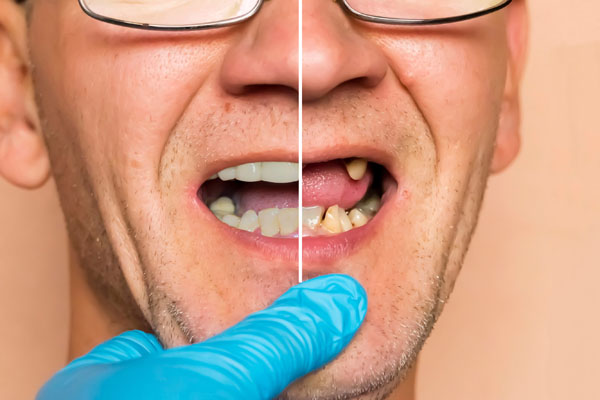 A dentist’s job is to make sure your teeth stay in great health. For many patients, this means considering the benefits of dental restorations. Dentists recommend restorative procedures when a patient has a damaged, diseased, or missing tooth. These standard treatments stop the problem in its tracks, prevent additional injury and infection, and even provide cosmetic benefits.
A dentist’s job is to make sure your teeth stay in great health. For many patients, this means considering the benefits of dental restorations. Dentists recommend restorative procedures when a patient has a damaged, diseased, or missing tooth. These standard treatments stop the problem in its tracks, prevent additional injury and infection, and even provide cosmetic benefits.
What are dental restorations?
Dental restoration involves supplementing existing teeth with synthetic materials. Traditionally, dentists have used metals and composite resin, but ceramic and porcelain parts are increasingly common due to their more natural appearance. Restorative work provides teeth with the necessary repairs, protection, and structural integrity to maintain optimal health.
Common restorative dentistry practices include:
- Fillings
- Crowns
- Bridges
- Dentures
- Implants
- Veneers
When would a dentist recommend dental restorations?
Dentists recommend dental restorations when a tooth or gum concern diminishes your oral health, the functionality of your teeth, or even your self-esteem. The most effective restorative procedure depends on the condition of your teeth and the problem you need to treat.
When you have a cavity
Cavities, or tiny holes, form when a patient fails to maintain good oral hygiene. Because cavities are so common, dentists often find themselves recommending dental fillings to combat them.
When a cavity wears down a tooth, a common way to prevent further damage is to fill the damaged area with synthetic materials. Fillings block harmful bacteria from exacerbating the cavity and restore the tooth’s healthy appearance and functionality. Dentists often recommend fillings as a preventative measure rather than a reactive one.
When you have a cracked, chipped, or missing tooth
If you have an externally-damaged tooth, the impact is more than just aesthetic. Even slight changes to a tooth’s structure degrade its integrity, putting the tooth at risk for injury or infection.
Crowns provide an ideal solution for restoring cracked, chipped, or missing teeth to their original condition. Built to resemble the shape and consistency of natural teeth, a crown sits on top of a damaged tooth to give the illusion that the tooth is still intact. Bridges, which consist of multiple crowns strung together, are ideal for filling the gap caused by a missing tooth, as open wounds invite bacteria and infection.
When you struggle with confidence
Sometimes, a dentist’s reason for recommending restorative dentistry has less to do with the patient’s physical health. If a patient has noticeable gum or teeth concerns that detract from their self-esteem, a dentist might recommend restorative work.
Although restorations are not intended to be cosmetic fixes, most dental repairs do improve a patient’s smile and confidence. Since ceramic and porcelain materials contribute to a more realistic appearance, dentists may suggest veneers to patients wanting a professional, polished touch.
Conclusion
Dentists recommend dental restorations when a patient presents with damaged, diseased, or missing teeth. Without protection, impaired teeth continue to deteriorate and can eventually lead to dental decay, tooth death, or systematic infection. These restorative practices primarily aim to improve a patient’s oral health, but patients looking for cosmetic enhancements benefit from the resulting fuller, healthier smile.
Request an appointment or call Highlands Family Dentistry at 214-491-5362 for an appointment in our Dallas office.
Related Posts
Thanks to advanced dental restorations, tooth loss is not the inevitable outcome of decay or damage that it once was. Restorations — including fillings, crowns, bridges, and implants — are designed to restore or replace damaged tooth structures or to prevent the advancement of decay. Many restorations can also improve the appearance of a patient’s…
Numerous things can interfere with a good smile. Whether it is a missing, cracked, chipped, damaged, or decayed tooth, dental restorations help improve how you look, prevent future dental issues, and improve the function of your teeth and mouth. Depending on the type and severity of the issue, there are various restoration procedures available.Some people…
After getting dental restorations such as fillings, implants, crowns, or root canals, it is important to follow any aftercare instructions given by the dentist. Doing so can help avoid damaging the restoration and causing further harm to the mouth. It can also allow the mouth to heal quickly and properly. Here are some tips commonly…
